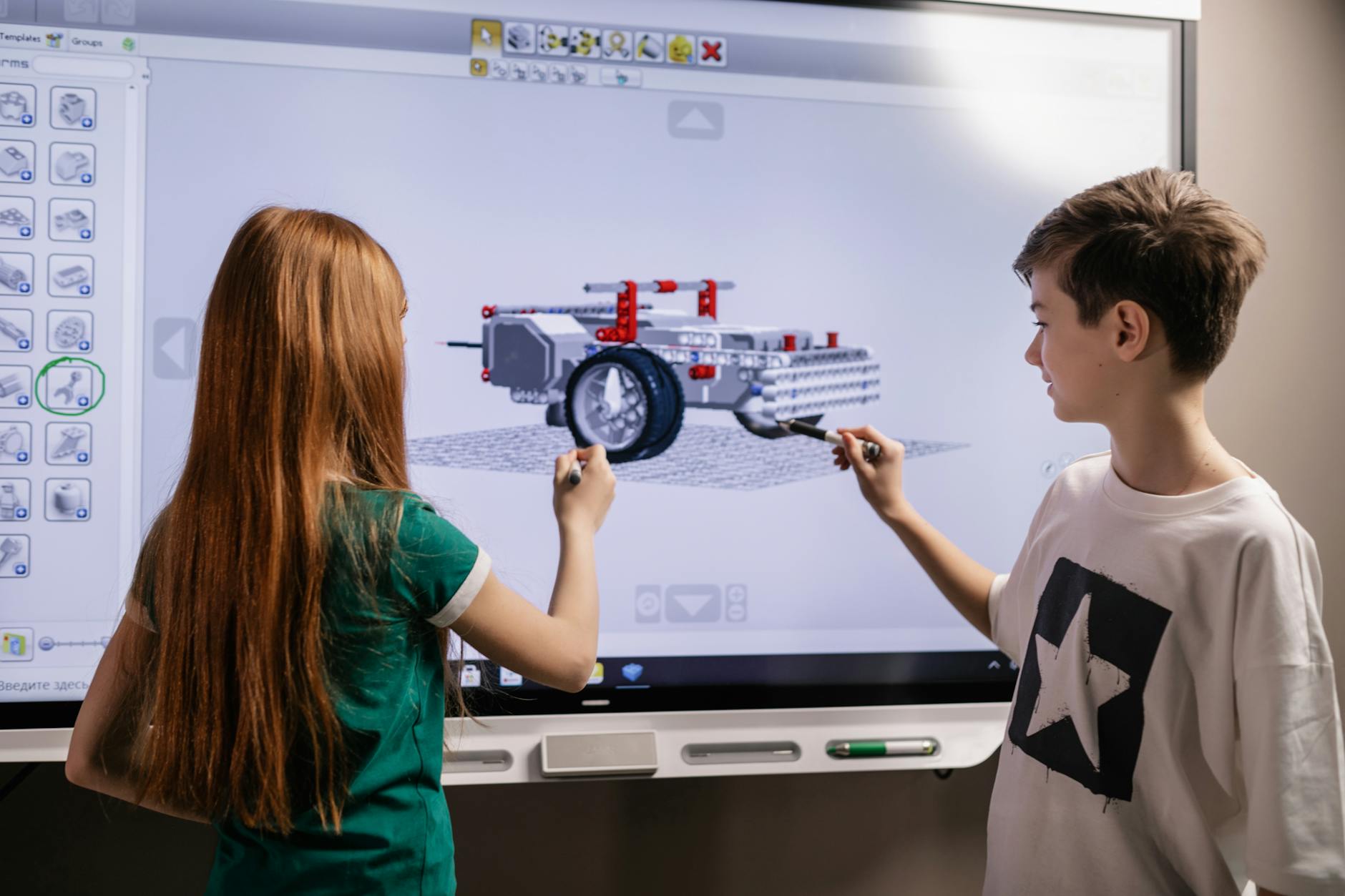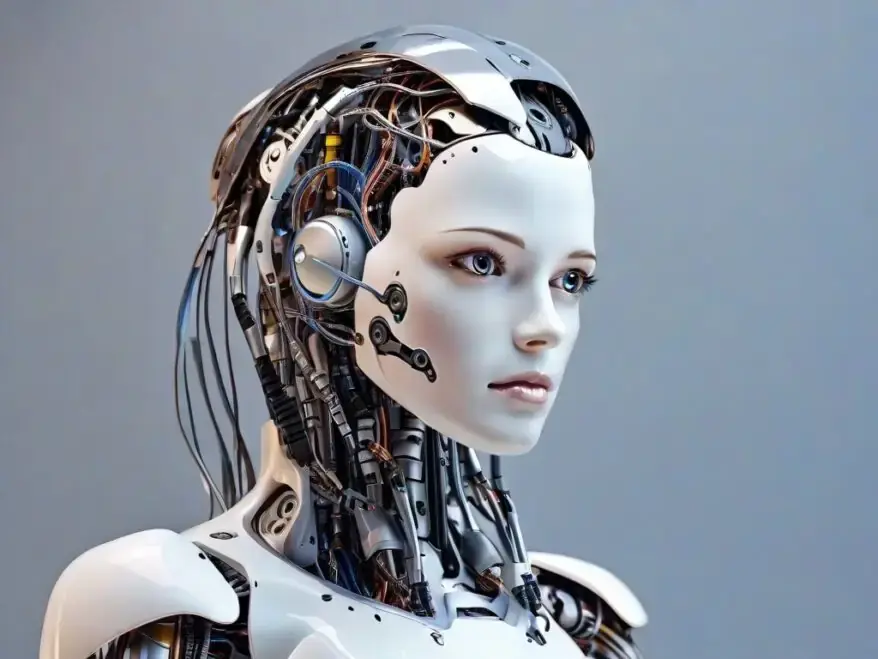What is Artificial Intelligence? Everything a Teen Wants to Know for Education and Career Planning
Artificial Intelligence (AI) is no longer just a concept from science fiction movies or a subject of academic discourse—it has become an integral part of our daily lives and is shaping the future in unexpected ways. For teenagers planning their education and career paths, understanding AI is more than just intriguing; it’s essential. So, let’s dive into what AI actually is, its applications, and how it impacts your future prospects in education and career planning. AI refers to the simulation of human intelligence in machines that are programmed to think and learn like humans. (Nkechi, Ojo, and Eneh 2024)These machines can perform tasks such as problem-solving, decision-making, and even understanding natural language.
 With AI’s growing presence, it’s crucial to recognize its applications across various fields. From healthcare to entertainment, AI is revolutionizing industries by enhancing efficiency and creating new opportunities. In healthcare, AI is used for diagnosing diseases, predicting patient outcomes, and personalizing treatment plans (Nkechi, Ojo, and Eneh 2024). AI powers recommendation systems on platforms like Netflix and Spotify, helping you discover new shows and music tailored to your tastes. In education, AI is transforming the way we learn by offering personalized learning experiences and intelligent tutoring systems that adapt to individual student needs.
With AI’s growing presence, it’s crucial to recognize its applications across various fields. From healthcare to entertainment, AI is revolutionizing industries by enhancing efficiency and creating new opportunities. In healthcare, AI is used for diagnosing diseases, predicting patient outcomes, and personalizing treatment plans (Nkechi, Ojo, and Eneh 2024). AI powers recommendation systems on platforms like Netflix and Spotify, helping you discover new shows and music tailored to your tastes. In education, AI is transforming the way we learn by offering personalized learning experiences and intelligent tutoring systems that adapt to individual student needs.
 As you consider your future, it’s important to think about how AI might influence the career paths you’re interested in. Whether you’re drawn to technology, healthcare, or even creative fields like art and design, AI is likely to play a role. Understanding the basics of AI can give you a competitive edge in these fields. AI is not just about coding and algorithms; it’s also about creativity and problem-solving.(Nkechi, Ojo, and Eneh 2024)(Kaplan 2020)(Kaplan 2020)
As you consider your future, it’s important to think about how AI might influence the career paths you’re interested in. Whether you’re drawn to technology, healthcare, or even creative fields like art and design, AI is likely to play a role. Understanding the basics of AI can give you a competitive edge in these fields. AI is not just about coding and algorithms; it’s also about creativity and problem-solving.(Nkechi, Ojo, and Eneh 2024)(Kaplan 2020)(Kaplan 2020)
Understanding Artificial Intelligence
The Basics of AI
At its core, Artificial Intelligence refers to the simulation of human intelligence in machines. These intelligent systems are designed to perform tasks that typically require human intelligence, such as reasoning, learning, problem-solving, perception, and language understanding.
- Machine Learning (ML): A subset of AI focused on building systems that can learn from and make decisions based on data. ML algorithms are used in a variety of applications, from email filtering and recommendation engines to more complex tasks like autonomous driving.
 ML is revolutionizing industries by enabling systems to improve their performance over time without explicit programming. This ability to learn and adapt makes ML a powerful tool in fields such as finance, healthcare, and marketing. As you explore career options, consider how ML might be applied in your field of interest.(Singh and Barak 2024)(PRASAD 2024)(Froolik 2024)
ML is revolutionizing industries by enabling systems to improve their performance over time without explicit programming. This ability to learn and adapt makes ML a powerful tool in fields such as finance, healthcare, and marketing. As you explore career options, consider how ML might be applied in your field of interest.(Singh and Barak 2024)(PRASAD 2024)(Froolik 2024) - Natural Language Processing (NLP): Enables machines to understand and respond to human language. NLP is used in applications such as chatbots, virtual assistants, and language translation services. NLP is transforming the way we interact with technology, making communication more seamless and intuitive. As technology continues to advance, NLP is becoming increasingly sophisticated, allowing for more accurate and context-aware interactions.
 This evolution in NLP technology is opening up new possibilities for careers in AI, as companies seek experts who can develop and refine these systems. Whether you’re interested in linguistics, computer science, or cognitive psychology, a career in NLP offers diverse opportunities to innovate and impact how humans and machines communicate.(undefined and Yagamurthy 2024)
This evolution in NLP technology is opening up new possibilities for careers in AI, as companies seek experts who can develop and refine these systems. Whether you’re interested in linguistics, computer science, or cognitive psychology, a career in NLP offers diverse opportunities to innovate and impact how humans and machines communicate.(undefined and Yagamurthy 2024) - Robotics: Involves AI in designing and operating robots for various tasks. Robotics is a fascinating field that combines engineering, computer science, and AI to create machines capable of performing tasks autonomously or with minimal human intervention.
 These robots are used in a wide range of industries, from manufacturing and healthcare to space exploration and agriculture.(Hasan 2023)(Walter et al. 2023)(Dheerthi et al. 2024)
These robots are used in a wide range of industries, from manufacturing and healthcare to space exploration and agriculture.(Hasan 2023)(Walter et al. 2023)(Dheerthi et al. 2024)
AI vs. Human Intelligence
AI systems are exceptional at handling tasks that involve big data and complex calculations. While humans are good at creativity, empathy, and strategic thinking, AI excels in areas like speed, consistency, and performing repetitive tasks without fatigue. Rather than replacing jobs, AI often aids humans by taking over mundane or data-intensive work.
 This allows people to focus on more meaningful and creative aspects of their roles. As AI continues to evolve, it is important for individuals to develop skills that complement these technologies. By enhancing skills in areas such as critical thinking, emotional intelligence, and problem-solving, individuals can work alongside AI systems effectively.(Davidovic 2023) Embracing a mindset of lifelong learning will be crucial as the landscape of work changes. Staying informed about the latest advancements in AI and understanding how these technologies can be integrated into various fields will provide a competitive edge. Exploring educational opportunities in AI, such as online courses, workshops, and degree programs, can help you gain the knowledge needed to thrive in this dynamic environment.
This allows people to focus on more meaningful and creative aspects of their roles. As AI continues to evolve, it is important for individuals to develop skills that complement these technologies. By enhancing skills in areas such as critical thinking, emotional intelligence, and problem-solving, individuals can work alongside AI systems effectively.(Davidovic 2023) Embracing a mindset of lifelong learning will be crucial as the landscape of work changes. Staying informed about the latest advancements in AI and understanding how these technologies can be integrated into various fields will provide a competitive edge. Exploring educational opportunities in AI, such as online courses, workshops, and degree programs, can help you gain the knowledge needed to thrive in this dynamic environment.
AI in Everyday Life
Applications You Interact with Daily
AI isn’t just a futuristic gadget—you’re already using it in several aspects of your daily life. Here are a few ways AI is making a difference:(Talati 2024)
- Smartphones: Facial recognition technology is a form of AI that unlocks your phone or processes payment.
- Social Media: Algorithms curate content based on your interests, facilitating a personalized experience.
- Online Shopping: AI-driven recommendation engines suggest products based on your browsing and purchase history.
- Virtual Assistants: Siri, Alexa, and Google Assistant use AI to understand natural language queries and assist you.
AI in Entertainment and Gaming
Teenagers engage with AI through platforms like Netflix, which uses AI to recommend shows and movies, or in video games that adapt and respond to player input. AI in entertainment is designed to enhance user experience by providing personalized content and interactive gameplay. Whether it’s suggesting the next series or creating dynamic game environments,
 AI is constantly working behind the scenes to make entertainment more engaging and tailored to individual preferences. As AI technology advances, it continues to revolutionize the way we consume media and interact with digital content. The integration of AI in entertainment not only improves the quality of content but also opens up new possibilities for creativity and innovation.(Hoeyweghen 2024)(Stahlke and Mirza-Babaei 2018)(Shaker, Yannakakis, and Togelius 2022)(Shena 2021)(Yang, Zhang, and Feng 2023)
AI is constantly working behind the scenes to make entertainment more engaging and tailored to individual preferences. As AI technology advances, it continues to revolutionize the way we consume media and interact with digital content. The integration of AI in entertainment not only improves the quality of content but also opens up new possibilities for creativity and innovation.(Hoeyweghen 2024)(Stahlke and Mirza-Babaei 2018)(Shaker, Yannakakis, and Togelius 2022)(Shena 2021)(Yang, Zhang, and Feng 2023)
AI in Education
AI technologies are enhancing personalized learning experiences, making it easier for students to grasp complex concepts through tools like an educational video maker, which helps create engaging and interactive learning materials.
How AI is Changing Learning
AI tools are transforming educational methods, adding a new dimension to traditional learning setups:
- Adaptive Learning: AI-driven platforms adjust content difficulty based on student performance, offering a personalized learning experience.(Er-Radi, Aammou, and Jdidou 2023) These platforms use algorithms to analyze data from student interactions, such as quiz results and time spent on tasks, to determine the most effective way to present new information. They can also identify patterns in learning behaviors, allowing educators to intervene early if a student is struggling.
 This proactive approach not only enhances the learning experience but also helps in closing knowledge gaps before they widen. By continuously adapting to the learner’s needs, these systems ensure that students remain engaged and motivated. They provide immediate feedback, which is crucial for reinforcing concepts and correcting misunderstandings in real-time. This immediate feedback loop helps students to quickly grasp complex topics and build confidence in their abilities.(Sung and Leong 2024)(undefined and Luo 2023)(Kröll and Burova-Keßler 2022)(Sarnato et al. 2024)
This proactive approach not only enhances the learning experience but also helps in closing knowledge gaps before they widen. By continuously adapting to the learner’s needs, these systems ensure that students remain engaged and motivated. They provide immediate feedback, which is crucial for reinforcing concepts and correcting misunderstandings in real-time. This immediate feedback loop helps students to quickly grasp complex topics and build confidence in their abilities.(Sung and Leong 2024)(undefined and Luo 2023)(Kröll and Burova-Keßler 2022)(Sarnato et al. 2024) - Tutoring Systems: Virtual tutors provide additional help to students outside of conventional classrooms.(Wilson and Pfeiffer 2023) These AI-powered tutors are available 24/7, offering assistance whenever students need it. They can answer questions, provide explanations, and even offer practice exercises to reinforce learning.
 They are designed to mimic human tutors by using natural language processing to understand and respond to student inquiries effectively. They adapt to each student’s learning pace and style, ensuring that the support provided is both relevant and effective. They can also track a student’s progress over time, providing insights into areas of improvement and topics that may require further attention.(Song 2024)
They are designed to mimic human tutors by using natural language processing to understand and respond to student inquiries effectively. They adapt to each student’s learning pace and style, ensuring that the support provided is both relevant and effective. They can also track a student’s progress over time, providing insights into areas of improvement and topics that may require further attention.(Song 2024) - Smart Classrooms: AI can analyze student engagement and monitor progress, helping teachers tailor their approaches. By collecting data on how students interact with the material, AI systems can identify areas where individuals may need extra support or challenge.
 This data-driven insight allows educators to customize lesson plans and activities that cater to the diverse needs of their students. With AI’s ability to process vast amounts of information quickly, teachers can receive real-time updates on student performance and adjust their teaching strategies accordingly. This not only enhances the learning experience but also ensures that no student is left behind.(Loots, Strydom, and Posthumus 2023)(Damasevicius and Sidekerskiene 2024)
This data-driven insight allows educators to customize lesson plans and activities that cater to the diverse needs of their students. With AI’s ability to process vast amounts of information quickly, teachers can receive real-time updates on student performance and adjust their teaching strategies accordingly. This not only enhances the learning experience but also ensures that no student is left behind.(Loots, Strydom, and Posthumus 2023)(Damasevicius and Sidekerskiene 2024)
AI Courses and Programs
Understanding the basics of AI is increasingly becoming part of the curriculum in many schools. Popular online platforms offer courses that teach introductory AI, coding, and data science skills—an excellent starting point for any budding AI enthusiast.
These courses often include hands-on projects that allow students to apply what they’ve learned in real-world scenarios.(Urban 2023)(Demir 2021)
AI Career Pathways
Exploring Career Opportunities in AI
Knowing where AI can lead you in your career is important:
- Data Scientist: They analyze complex data to uncover insights and trends. This role requires strong skills in statistics and programming. They often work with large datasets to identify patterns and make data-driven decisions that can influence business strategies. Data scientists are also responsible for creating data models and visualizations to communicate their findings effectively.

- Machine Learning Engineer: These professionals develop algorithms that allow machines to learn and make predictions. They work closely with data scientists to implement models that can process and analyze data efficiently.
 They are responsible for optimizing these models to improve their accuracy and performance. They often use programming languages like Python and frameworks such as TensorFlow or PyTorch to build and refine machine learning models.(Pasupuleti 2024)(Chopra, Modi, and Singh 2023)
They are responsible for optimizing these models to improve their accuracy and performance. They often use programming languages like Python and frameworks such as TensorFlow or PyTorch to build and refine machine learning models.(Pasupuleti 2024)(Chopra, Modi, and Singh 2023) - AI Research Scientist: They explore fundamental questions and come up with innovations to advance AI technology. They often work in academic or corporate research settings, focusing on developing new algorithms and models that push the boundaries of what AI can achieve.
 They collaborate with other scientists and engineers to publish their findings in scientific journals and present at conferences. Their work is crucial for driving the field forward, as they tackle complex problems and seek to understand the underlying principles of artificial intelligence.(Hassan 2023)
They collaborate with other scientists and engineers to publish their findings in scientific journals and present at conferences. Their work is crucial for driving the field forward, as they tackle complex problems and seek to understand the underlying principles of artificial intelligence.(Hassan 2023)
Skills to Develop
If you’re interested in an AI career, consider building the following skills:
- Programming Proficiency: Languages like Python, Java, and R are essential for developing AI models. Understanding these languages will enable you to implement algorithms, manipulate data, and create applications that leverage AI technologies. Additionally, gaining experience with libraries and frameworks such as TensorFlow, PyTorch, and Scikit-learn can significantly enhance your ability to build sophisticated AI systems. Familiarity with these tools will not only make you more efficient in developing AI solutions but also open up opportunities for innovation and experimentation. Exploring these tools can also help you collaborate effectively with other AI professionals, as they are widely used in the industry. Being proficient in these programming languages and tools will also give you a competitive edge when applying for AI-related jobs, as employers often look for candidates who can hit the ground running with minimal training.(Jurczyk 2021)(Pasupuleti 2024)(Eve 2023)(Qianyi 2024)(Eisenbardt 2024)(Guo 2023)(Hao and Ho 2019)
- Mathematics and Statistics: A solid foundation in math is critical for understanding machine learning algorithms. Additionally, statistics help in interpreting data and validating models, ensuring that AI systems perform accurately and reliably.(Little 2019) Mathematics provides the tools needed to develop algorithms, while statistics offer methods for analyzing data patterns and trends.(Little 2019)
- Critical Thinking: The ability to analyze and solve complex problems is fundamental.(Octaviana, Hamid, and Kasli 2022) It involves evaluating information, identifying patterns, and making informed decisions based on evidence. Developing critical thinking skills can help you approach AI challenges with a strategic mindset, allowing you to devise innovative solutions and anticipate potential issues. Engaging in activities that challenge your reasoning abilities, such as puzzles, debates, or coding competitions, can further enhance these skills. Participating in group discussions and collaborative projects can also provide valuable opportunities to practice critical thinking. Engaging with diverse perspectives during these discussions can broaden your understanding and help you consider different angles when tackling AI problems.(Kasemsap 2020)(Shen, Zhao, and Huang 2011)(Altier 2023)(Altier 2023)(Wulansari and Nabawi 2022)
Prepping for an AI Future
Educational Pathways
Embarking on a journey into AI doesn’t necessitate a rigorous path; however, the right educational background can make a significant difference:

- High School Preparation: Take advanced math classes, computer science, and engage in science-themed clubs. Participating in extracurricular activities such as robotics clubs or coding bootcamps can also provide hands-on experience and foster a deeper understanding of AI concepts.
- Higher Education: Degrees in computer science, data science, or engineering are beneficial. Many universities now offer specialized AI programs. These programs often include courses in machine learning, neural networks, and natural language processing.
Extracurricular Activities
Get involved in extracurricular activities to further enhance your understanding:
- Coding Clubs: Participate in coding clubs or hackathons to apply your skills in a practical setting.(Seibold 2024)
- Online Courses and Certifications: Platforms like Coursera, edX, and Udemy offer courses specifically designed for budding AI engineers.(Likovič and Rojko 2023)
Real-World Implications of AI
Ethical Considerations
AI brings with it various ethical questions, such as privacy concerns and job displacement. It’s crucial to engage in discussions about ethical AI to ensure developments remain beneficial and fair for society.(Abbas 2023)
The Future of Work
With the rise of AI, jobs and industries are evolving. Creativity, emotional intelligence, and advanced critical thinking remain key differentiators for humans in the workforce.(Rohmah and Mukhlis 2022)
Conclusion
Artificial Intelligence is an exciting field with limitless possibilities that can shape not only the future of industries but also your educational journey and career aspirations. By understanding and engaging with AI, you set yourself up for a future ready to meet new challenges and leverage exciting opportunities. As you plan your educational and career path, keep an eye on how AI is integrating with and transforming your areas of interest.
Remember, the journey into AI is not just about acquiring technical skills but also about cultivating a mindset that embraces continuous learning and adaptation. Stay curious, ask questions, and don’t hesitate to dive into projects that challenge your understanding. Embrace the unknown, and let your passion for discovery guide you. You can choose to pursue a career directly in AI or apply its principles to other fields, the skills and insights you gain will be invaluable. Keep exploring, stay informed, and let your enthusiasm for AI lead the way as you carve out your unique path in this dynamic and transformative domain. The future is bright for those who are willing to take the plunge into this fascinating world.
References
Abbas, Zafer. “Securing cloud-based ai and machine learning models: Privacy and ethical concerns.” Center for Open Science, 2023, https://doi.org/10.31219/osf.io/eyb3c
Altier, William J. “Process expertise-a critical managing skill.” Oxford University PressNew York, NY, 2023, pp. 19-23, https://doi.org/10.1093/oso/9780195131963.003.0003
Altier, William J. “Decision analysis.” Oxford University Press, New York, NY, 2023, pp. 43-78, https://doi.org/10.1093/oso/9780195131963.003.0005
Chopra, Aryan, Aditya Modi, and Brijendra Singh. “Machine learning algorithm with tensorflow and scikit for next generation systems.” IGI Global, 2023, pp. 17-49, https://doi.org/10.4018/978-1-6684-8531-6.ch002
Damasevicius, Robertas, and Tatjana Sidekerskiene. “Ai as a teacher.” IGI Global, 2024, pp. 1-24, https://doi.org/10.4018/979-8-3693-2728-9.ch001
Davidovic, Jovana. “On the purpose of meaningful human control of ai.” Frontiers Media SA, vol. 5, 2023, https://doi.org/10.3389/fdata.2022.1017677
Demir, Ümit. “The effect of computer-free coding education for special education students on problem-solving skills.” ICT in Practice, vol. 4, no. 3, 2021, pp. 3-30, https://doi.org/10.21585/ijcses.v4i3.95
Dheerthi, N., et al. “A comprehensive analysis of bio-inspired soft robotic arm for healthcare applications.” IGI Global, 2024, pp. 1-23, https://doi.org/10.4018/979-8-3693-5767-5.ch001
Eisenbardt, Tomasz. “Expiring technologies face to the development of generative ai: Programming languages.” Academic Conferences International Ltd, vol. 25, no. 1, 2024, pp. 228-236, https://doi.org/10.34190/eckm.25.1.2515
Er-Radi, Hicham, Souhaib Aammou, and Aymane Jdidou. “Personalized learning through adaptive content modification.” Centro Universitario La Salle – UNILASALLE, vol. 15, no. 39, 2023, pp. 263-275, https://doi.org/10.18316/rcd.v15i39.11153
Froolik, Alderd J. “Effect ai powered email automation: An analysis of email marketing automation.” Center for Open Science, 2024, https://doi.org/10.31219/osf.io/uzsaf
Hao, Jiangang, and Tin Kam Ho. “Machine learning made easy: A review of scikit-learn package in python programming language.” American Educational Research Association (AERA), vol. 44, no. 3, 2019, pp. 348-361, https://doi.org/10.3102/1076998619832248
Hasan, Abdullah Ibnah. “Revolutionizing space exploration and colonization: A deep dive into how recent developments in robotics and autonomous systems are changing the game.” MDPI AG, 2023, https://doi.org/10.20944/preprints202310.0930.v1
Hassan, Ali. “Advancements in computer science: From algorithms to ai.” Center for Open Science, 2023, https://doi.org/10.31219/osf.io/rm7ta
Hoeyweghen, Sarah Van. “Speaking of games: Ai-based content moderation of real-time voice interactions in video games under the dsa.” Edward Elgar Publishing, vol. 7, no. 1, 2024, pp. 30-46, https://doi.org/10.4337/ielr.2024.01.04
Jurczyk, Thomas. “Clustering with scikit-learn in python.” University of Sussex, no. 10, 2021, https://doi.org/10.46430/phen0094
Kaplan, Jerry. “The impact of artificial intelligence on social equity.” Oxford University Press, 2020, https://doi.org/10.1093/wentk/9780190602383.003.0007
Kaplan, Jerry. “The impact of artificial intelligence on human labor.” Oxford University Press, 2020, https://doi.org/10.1093/wentk/9780190602383.003.0006
Kasemsap, Kijpokin. “Advocating problem-based learning and creative problem-solving skills in global education.” IGI Global, 2020, pp. 1372-1398, https://doi.org/10.4018/978-1-7998-3022-1.ch072
Kröll, Martin, and Kristina Burova-Keßler. “Use of ai tools in learning platforms and the role of feedback for learning.” AHFE International, 2022, https://doi.org/10.54941/ahfe1001504
Likovič, Anja, and Katarina Rojko. “E-learning and a case study of coursera and edx online platforms.” Walter de Gruyter GmbH, vol. 14, no. 1, 2023, pp. 94-120, https://doi.org/10.2478/rsc-2022-0008
Little, Max A. “Statistical machine learning.” Oxford University Press, Oxford, 2019, pp. 149-186, https://doi.org/10.1093/oso/9780198714934.003.0006
Loots, Sonja, Francois Strydom, and Hanle Posthumus. “Learning from students: Factors that support student engagement in blended learning environments within and beyond classrooms.” University of Pretoria – ESI Press, vol. 11, no. 2, 2023, https://doi.org/10.24085/jsaa.v11i2.4897
Nkechi, Agatha Aballa, Akintayo O. Ojo, and Obinna A. Eneh. “Impact of artificial intelligence in achieving quality education.” IntechOpen, 2024, https://doi.org/10.5772/intechopen.1004871
Octaviana, Sarah, Abdul Hamid, and Elisa Kasli. “Analysis of critical thinking ability physics education students to solve geometrical optics problems.” LPPM Unsyiah, vol. 2, no. 2, 2022, pp. 87-92, https://doi.org/10.24815/ajse.v2i2.17184
PRASAD, PRANJAL. “Exploring machine learning algorithms for email spam filtering.” SPAST Foundation, vol. 1, no. 6, 2024, https://doi.org/10.69848/sreports.v1i6.5079
Qianyi, Yang. “Systematic evaluation of ai-generated python code: A comparative study across progressive programming tasks.” Springer Science and Business Media LLC, 2024, https://doi.org/10.21203/rs.3.rs-4955982/v1
Seibold, Heidi. “Code clubs – good coding practices for all.” Front Matter, 2024, https://doi.org/10.59350/1pjg4-yb854
Shaker, Noor, Georgios Yannakakis, and Julian Togelius. “Towards automatic personalized content generation for platform games.” Association for the Advancement of Artificial Intelligence (AAAI), vol. 6, no. 1, 2022, pp. 63-68, https://doi.org/10.1609/aiide.v6i1.12399
Shen, Huizhang, Jidi Zhao, and Wayne W. Huang. “Mission-critical group decision-making.” IGI Global, 2011, pp. 390-415, https://doi.org/10.4018/978-1-60566-090-5.ch025
Singh, Khushwant, and Dheerdhwaj Barak. “Healthcare performance in predicting type 2 diabetes using machine learning algorithms.” IGI Global, 2024, pp. 130-141, https://doi.org/10.4018/979-8-3693-3679-3.ch008
Talati, Dhruvitkumar. “Ai (artificial intelligence) in daily life.” Institute of Electrical and Electronics Engineers (IEEE), 2024, https://doi.org/10.36227/techrxiv.170751714.46556037/v1
Deepak Nanuru Yagamurthy, and Rajesh Azmeera. “Advancements in natural language processing (nlp) and its applications in voice assistants and chatbots.” Scientific Research and Community Ltd, 2024, pp. 1-6, https://doi.org/10.47363/jaicc/2023(2)326
To stay updated with the latest developments in STEM research, visit ENTECH Online. This is our digital magazine for science, technology, engineering, and mathematics.
At ENTECH Online, you’ll find a wealth of information. We offer insights and resources to fuel your curiosity. Our goal is to inspire your passion for new scientific discoveries.






